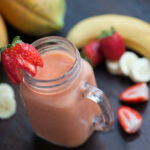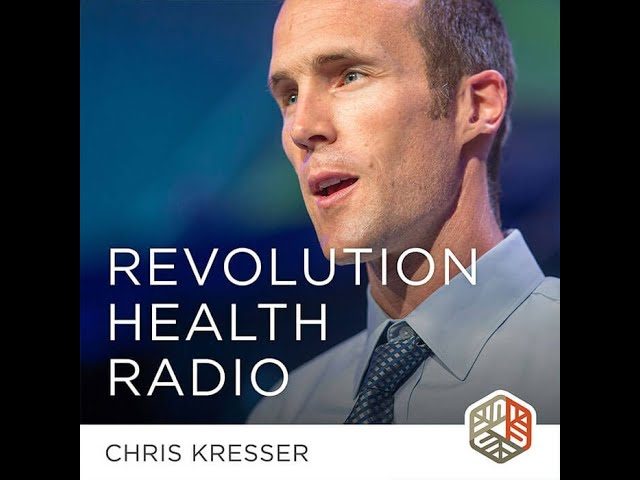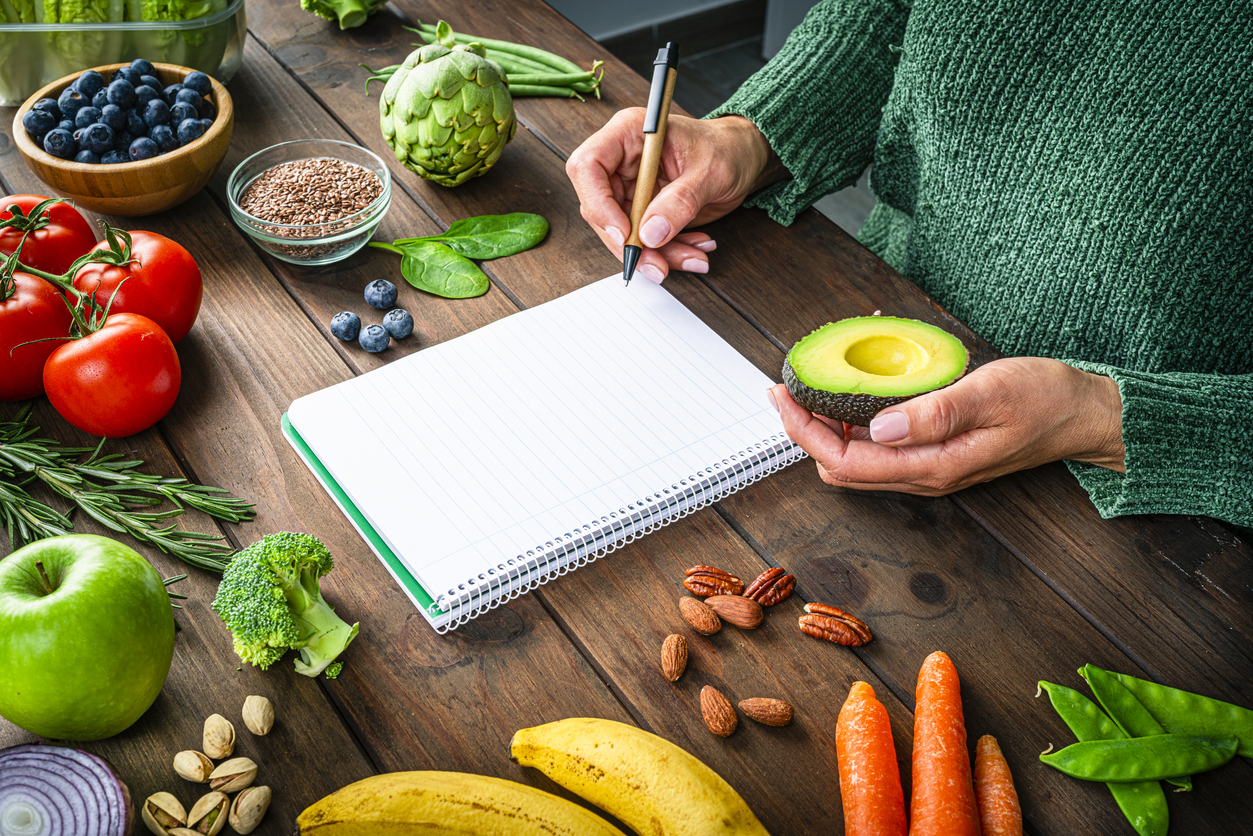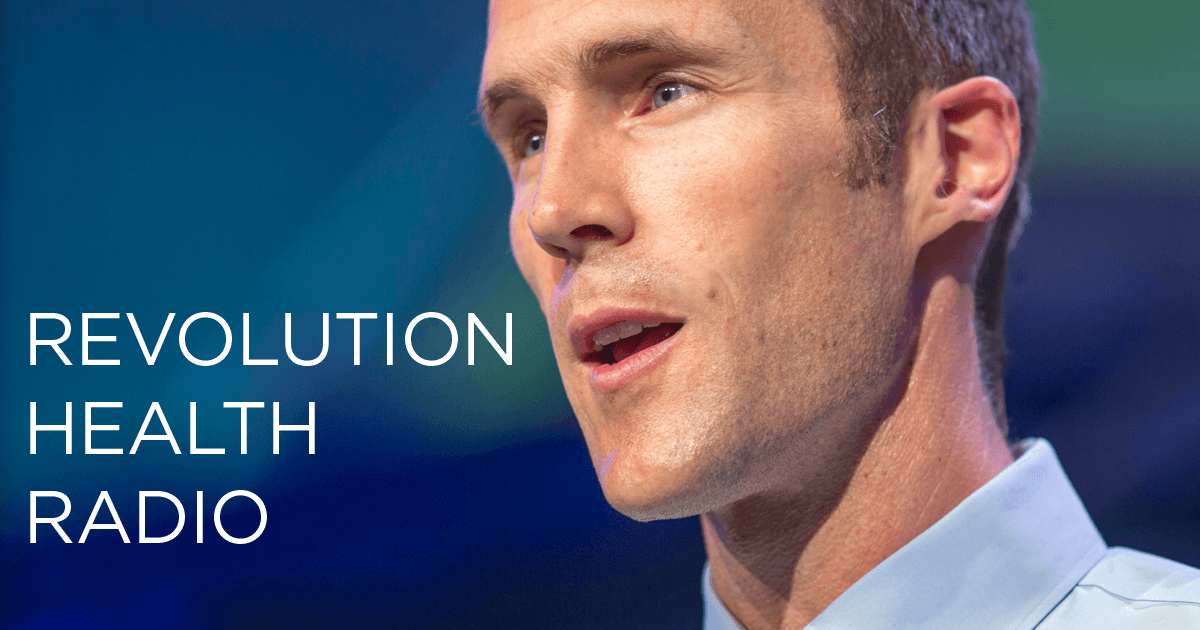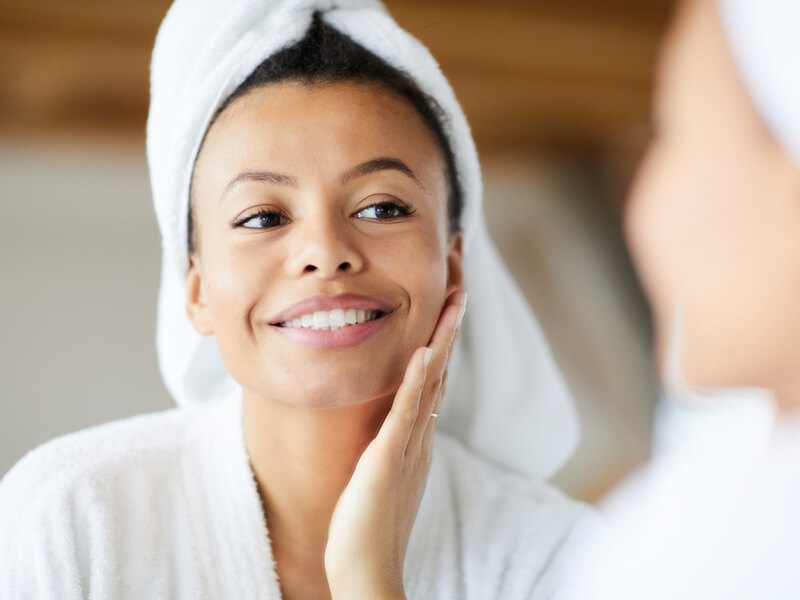
7 Foods That Promote Younger Skin and Prevent Wrinkles

Page Contents:
Your food and lifestyle choices influence every aspect of your health—including the vibrancy and health of your skin. Eating a diet made up of nutritious whole foods that are rich in the vitamins, minerals, and other beneficial compounds your skin needs can lead to fewer wrinkles and younger-looking skin no matter your age. In this article, I’ll share seven foods that can help your skin look younger, and I’ll discuss what’s causing age-related wrinkles to appear in the first place.
You can lessen the appearance of wrinkles or prevent them altogether through your diet. Check out this article for seven foods to help you prevent wrinkles and achieve younger-looking skin. #paleo #nutrition #chriskresser
What Causes Wrinkles?
Free radicals are thought to be a major contributor to cellular aging. (1) The free radical theory of aging suggests that it’s the accumulation of cellular damage that leads to visible signs of growing older, like wrinkles (as well as other internal signals of aging). That cellular damage occurs over time when there’s an excess of reactive oxygen species that are generated by oxidative metabolism.
Our bodies naturally go through a process where we use antioxidants to neutralize the damage caused by free radicals. When that process becomes unbalanced, meaning we can’t neutralize free radicals as quickly as they’re produced, oxidative damage occurs—which can lead to a number of serious chronic illnesses, like type 2 diabetes, cardiovascular disease, and autoimmunity (including Hashimoto’s thyroiditis). (2, 3, 4, 5)
A number of factors contribute to oxidative damage, including the consumption of spoiled industrial seed oils, insufficient antioxidant status, and a number of lifestyle factors like excess stress, disrupted sleep, cigarette smoking, and more. This is why it’s important that you get enough antioxidants in your diet (and enough of the nutrients healthy skin needs) while also eliminating inflammatory foods like industrial seed oils.
Aging is a complex process with far-reaching effects throughout the body, and this short explanation just scratches the surface of what’s involved. For an in-depth look at what causes aging and what you should eat to slow the process, check out “Nutrition and Aging: What to Eat for a Long and Healthy Life,” by nutritionist Lindsay Christensen.
Can You Reverse Wrinkles after They’ve Formed?
No, you can’t completely eradicate wrinkles after they’ve developed (nor can you keep yourself 100 percent wrinkle-free as you age). However, even though you may not be able to fully reverse wrinkles after they form, it is possible to improve the overall appearance of your skin through your diet. Adopting a skin-healthy diet can mean better elasticity, a fuller appearance, and a reduction in skin roughness and dryness. And if you’re switching from an inflammatory, standard American diet to an anti-inflammatory diet, you’re likely to see some dramatic improvements.
If you’re a licensed medical practitioner, taking a patient-focused, root-cause-based approach can also produce dramatic improvements in your patients’ overall health. That’s the heart of Functional Medicine, and it’s what we teach in the ADAPT Practitioner Training Program. Our program goes in depth into how this approach can help your patients heal from a number of chronic conditions (including skin issues like rosacea, acne, eczema, and more), and we teach you how to effectively apply it in your practice. Find out more about our program and how it can help you turn the tide of chronic disease.
The Nutrients and Minerals That Prevent Wrinkles
Your skin needs adequate amounts of these nutrients and minerals to maintain its elasticity, smoothness, and overall health:
- Omega-3 fatty acids
- Pantothenic acid (vitamin B5)
- Selenium
- Silica
- Sulfur
- Vitamin C
- Vitamin E
- Vitamin K2
Omega-3 Fatty Acids
Omega-3 fatty acids are anti-inflammatory, and they play a major role in regulating systemic inflammation. They’ve been demonstrated to inhibit inflammation in the skin caused by ultraviolet (UV) radiation, and may even reduce the risk of skin cancer. (6) Getting enough omega-3 fatty acids could lead to smoother, younger-looking skin, and as a bonus, they may help with inflammatory skin conditions like acne and psoriasis. It’s important to note that your diet should strike the right balance between omega-3s and omega-6 fatty acids (and that balance is notoriously off in the standard American diet).
Pantothenic Acid (Vitamin B5)
Pantothenic acid, or vitamin B5, is a water-soluble vitamin that’s present in virtually all types of food and required by nearly every type of organism for growth and metabolic function. In addition to supporting wound healing and potentially promoting the growth and differentiation of keratinocytes (which your skin needs for a healthy barrier function), pantothenic acid significantly increases levels of glutathione in the cells, which acts as a potent antioxidant in the skin. (7, 8, 9, 10)
As I mentioned, antioxidants are crucial for preventing oxidative damage. Increased levels of glutathione protect your cell membranes, which helps reduce the effects of sun damage, pollutants, and other stressors. This, in turn, can help reduce the signs of aging, prevent wrinkles, and even defend against skin cancer.
Selenium
Selenium is a trace mineral and a component of glutathione peroxidase, which is an enzyme necessary for the antioxidant function of glutathione. As you now know, glutathione is one of the major antioxidants in the body that protects against cellular damage from the free radicals that cause inflammation and aging. That means to get the full skin-protective benefits of glutathione, you need selenium.
Despite its importance for our skin and overall health, many people may be at risk for a selenium deficiency. (11) This could be due to: (12)
- Poor levels of selenium in the soil
- Inadequate intake
- Intestinal disorders that affect absorption
Selenium also likely plays a complementary role with vitamin E in increasing glutathione activity and reducing overall oxidative stress in the body.
Silica
Silica is another important trace mineral. In animals, silica deficiency has been shown to result in poorly formed connective tissues, including collagen, and it likely plays a functional role in human health, as well. (13)
Collagen gives skin its structure and strength. In fact, when collagen breaks down as we age or we don’t produce enough of it, wrinkles and sagging skin develop as a result, meaning that proper collagen formation is necessary for maintaining tight, wrinkle-free skin. Silica helps that process by contributing to the formation of glycosaminoglycans (GAGs), which are structural building blocks of connective tissues. One well-known GAG that’s important for skin health is hyaluronic acid, which has been shown to promote skin cell proliferation and increase the presence of retinoic acid, improving the skin’s hydration. (14) Therefore, a deficiency in silica could result in reduced skin elasticity (and wound healing) due to its role in collagen and GAG formation.
Sulfur
Like silica, sulfur is another mineral that’s necessary for collagen synthesis. Research shows that animals fed a sulfur-deficient diet produce less collagen than normal, demonstrating how a diet with inadequate sulfur can contribute to a reduction in collagen and subsequently cause an increase in skin wrinkling. (15) Getting enough sulfur in your diet can help maintain collagen production and keep your skin looking firm.
Sulfur is also required for the synthesis of glutathione, and the level of glutathione in the body is greatly impacted by having adequate sulfur (specifically sulfur-containing amino acids) in the diet. (16)
Vitamin C
Vitamin C also plays a crucial role in the regulation of collagen; in fact, observational studies have shown that diets high in vitamin C are associated with better skin appearance and less skin wrinkling. (17, 18) Vitamin C may also help prevent and treat UV-induced photodamage by acting as an antioxidant. (19)
Vitamin E
Vitamin E is secreted on the skin’s surface through sebum—an important protective factor for your skin. (20) Vitamin E is a potent anti-inflammatory agent, defending the skin against free radicals and reactive oxygen species that would otherwise cause damage, and, as I mentioned, it may play a synergistic role with selenium in improving glutathione levels in the body. (21, 22) High enough levels of vitamin E in the skin may also prevent inflammatory damage from sun exposure, helping to reduce the aging and skin cancer risk from excessive UV radiation.
Vitamin K2
Vitamin K2 offers a number of health benefits and is likely beneficial for preventing wrinkling and premature aging. This is because vitamin K2 prevents calcification of our skin’s elastin, which is a protein that gives skin the ability to spring back, smoothing out lines and wrinkles. (23) In fact, research suggests that people who cannot metabolize vitamin K end up with severe premature skin wrinkling. (24)
The most effective thing you can do to prevent wrinkles from forming is to ensure you get enough of these compounds in your diet by focusing on nutrient-dense, whole-food sources.
Free eBook
Find Out What Else Your Skin Needs
Healthy skin depends on a number of nutrients, minerals, and beneficial compounds. Find out what else your skin needs and learn how your diet can alleviate skin issues.
I hate spam too. Your email is safe with me. By signing up, you agree to our privacy policy.
Seven Foods for Younger Skin and Fewer Wrinkles
The first step to adopting a skin-healthy diet is to ensure that you’re following an anti-inflammatory diet (like an ancestral, or Paleo, diet), rather than a standard American diet. This will ensure that you’re not eating foods that can cause wrinkles, like spoiled industrial seed oils, and it will also go a long way to ensure that you’re getting whole-food sources of the nutrients you need for youthful, wrinkle-free skin. For the best results, focus on these seven foods.
1. Colorful Fruits and Vegetables
Adding a variety of colorful fruits and vegetables to your diet is a must for wrinkle prevention. Many of these foods are excellent sources of several nutrients and minerals you need, like:
- Bell peppers, which are excellent for vitamins C and E
- Broccoli, which provides vitamins C and E and pantothenic acid
- Brussels sprouts, which are rich in sulfur and vitamins C and E
- Strawberries, which offer vitamin C and silica
- Leafy greens like kale, spinach, turnip greens, chard, and collards, which provide vitamins C and E and sulfur
For more vitamin C, include:
- Guava
- Kiwi
- Citrus (orange, lemon, etc.)
- Fresh herbs like cilantro, chives, thyme, basil, and parsley
Garlic, onions, and asparagus are sulfur-rich food sources, while leeks, green beans, cucumbers, mangoes, celery, asparagus, and rhubarb provide silica. (25)
2. Grass-Fed Meat, Dairy Products, and Egg Yolks
Grass-fed meat is a nutrient powerhouse, providing glutathione, selenium, and some vitamin E (though plant sources are generally better for this antioxidant). Animal protein also plays an important role in maintaining muscular health, which becomes more important as we age.
High-fat dairy products like butter and cheese from grass-fed cows provide vitamin K2. Importantly, conventional dairy products from grain-fed cattle are not a good source of vitamin K2; cattle need to graze on grasses that are rich in vitamin K1 to produce high levels of K2.
Egg yolks are an excellent source of sulfur, vitamin K2, and pantothenic acid. (26) Try to choose eggs from pasture-raised chickens for a more complete nutrient profile.
3. Bone Broth
Bone broth is a traditional addition to any healthy diet. It’s a rich resource for collagen, gelatin, and GAGs—all important components for healthy skin. You can make your own bone broth at home using grass-fed or pasture-raised beef or chicken bones (you can find a recipe here), or you can purchase a packaged option. Look for organic broth that comes from pasture-raised animals, and steer clear of BPA-containing cans.
4. Fermented Foods
Sauerkraut and other fermented crucifers are other great sources of sulfur, as the fermentation process may make sulfur amino acids more bioavailable. Sauerkraut is also quite high in vitamin K2, as is natto, a fermented soybean dish.
What’s more, fermented foods provide probiotics, which carry extensive benefits for your gut health and the health of your skin.
5. Nuts and Seeds
Sunflower seeds and almonds provide vitamin E (olive oil provides a moderate amount, as well). Since vitamin E is fat-soluble, it’s important to eat these foods with plenty of healthy fat to boost absorption.
Brazil nuts are true heavy hitters when it comes to selenium—just two Brazil nuts daily will provide you with enough.
6. Liver
Liver is nature’s superfood, and for good reason. Beef liver contains:
- Vitamin C
- Vitamin E
- Vitamin K2
- Pantothenic acid
- Selenium
7. Seafood
Cold-water fatty fish are an excellent source of omega-3s (and I generally recommend eating fish rather than taking fish oil supplements if possible). Fish are also a good source of sulfur, selenium, and pantothenic acid. Focus on adding around one pound per week of:
- Salmon
- Sardines
- Tuna
- Trout
- Mackerel
- Herring
- Whitefish
- Sturgeon
What Else You Can Do for Younger-Looking Skin
Making lifestyle changes can also have a big impact on the appearance of your skin. You’ll also prevent wrinkles by embracing ancestral health techniques, like:
- Managing your stress: Stress can worsen skin issues and cause negative effects throughout the body. Try practicing regular stress management through yoga, deep breathing, journaling, or mindfulness meditation.
- Getting enough sleep: Lack of sleep significantly affects the appearance of your skin (and it carries its own set of negative consequences for your health). Practice good sleep hygiene by setting your own nighttime routine, limiting your exposure to artificial light, and sleeping in a cool, dark room.
- Engaging in the right amount of exercise: Too little exercise can damage your skin health—but too much exercise can cause problems, as well. Focus on getting a mix of cardio and resistance training three to five days per week.
Practicing smart sun exposure is also crucial for youthful-looking skin. Excessive UV radiation ages your skin, but hiding from the sun or slathering on sunscreen every time you venture outdoors isn’t the answer (sunscreen has its own potential problems, and your body needs the right amount of vitamin D to be healthy). Instead, I recommend spending between 15 minutes to an hour outdoors per day (the exact amount will vary depending on your skin tone) and wearing protective clothing if you have to spend a significant part of your day in direct sunlight.
It’s clear that the diet and lifestyle choices you make will impact the health and appearance of your skin—in fact, making smart decisions now could have an exponential impact as you age. That’s why I’m such a big proponent of ancestral health: aligning our diet and lifestyle with our genetics and biology is a surefire way to enjoy longer, healthier lives.


